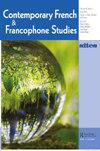L’art classique chinois dans la pensée française et francophone contemporaine
IF 0.2
4区 文学
0 LITERATURE, ROMANCE
引用次数: 0
Abstract
Abstract Chinese art, in particular literati calligraphy and painting in the Chinese classical period, is an important object of reflection and imagination for contemporary French and Francophone theorists. Focusing on the interpretation of Chinese art among these theorists, this article will first examine how Chinese classical painting and calligraphy entered the French theoretical horizon of the twentieth century; secondly, it will try to make a synthesis of some emblematic theorists concerned (Henri Michaux, Hubert Damisch, Jacques Maritain, Jean-François Billeter, François Jullien, François Cheng) and their theoretical works related to Chinese classical art, in order to draw some main lines and orientations on the history of the approaches of Chinese classical art in the West; finally, it will attempt to propose the perspective, intercultural and intermedia, to analyze the dialogue between the French and Francophone contemporary thought and the Chinese pictorial and calligraphic classical art.当代法国和法语国家思想中的中国古典艺术
摘要 中国艺术,尤其是中国古典时期的文人书画,是当代法国和法语国家理论家思考和想象的重要对象。本文将以这些理论家对中国艺术的阐释为重点,首先探讨中国古典书画是如何进入二十世纪法国理论界的;其次,试图对一些具有代表性的相关理论家(亨利-米修、于贝尔-达米施、雅克-马里坦、让-弗朗索瓦-比勒特、弗朗索瓦-朱利安、弗朗索瓦-程)及其与中国古典艺术相关的理论著作进行综合梳理,从而得出西方中国古典艺术研究方法史的一些主线和方向;最后,试图提出跨文化和跨媒体的视角,分析法国和法语国家当代思想与中国绘画和书法古典艺术之间的对话。
本文章由计算机程序翻译,如有差异,请以英文原文为准。
求助全文
约1分钟内获得全文
求助全文
来源期刊

Contemporary French and Francophone Studies
LITERATURE, ROMANCE-
CiteScore
0.30
自引率
0.00%
发文量
43
期刊介绍:
An established journal of reference inviting all critical approaches on the latest debates and issues in the field, Contemporary French & Francophone Studies (formerly known as SITES) provides a forum not only for academics, but for novelists, poets, artists, journalists, and filmmakers as well. In addition to its focus on French and Francophone studies, one of the journal"s primary objectives is to reflect the interdisciplinary direction taken by the field and by the humanities and the arts in general. CF&FS is published five times per year, with four issues devoted to particular themes, and a fifth issue, “The Open Issue” welcoming non-thematic contributions.
 求助内容:
求助内容: 应助结果提醒方式:
应助结果提醒方式:


